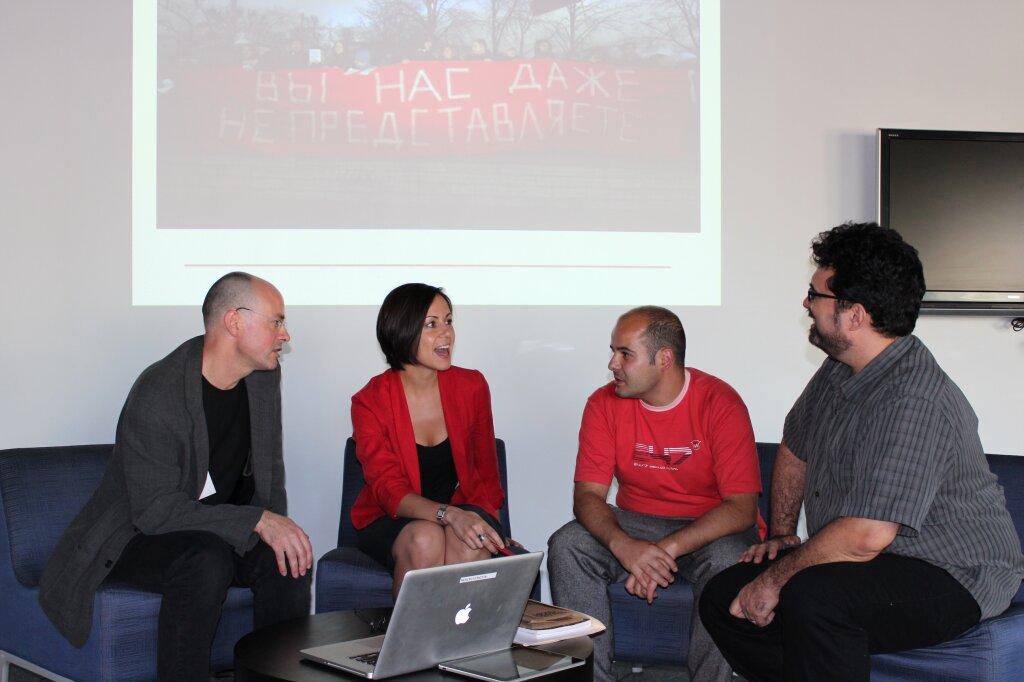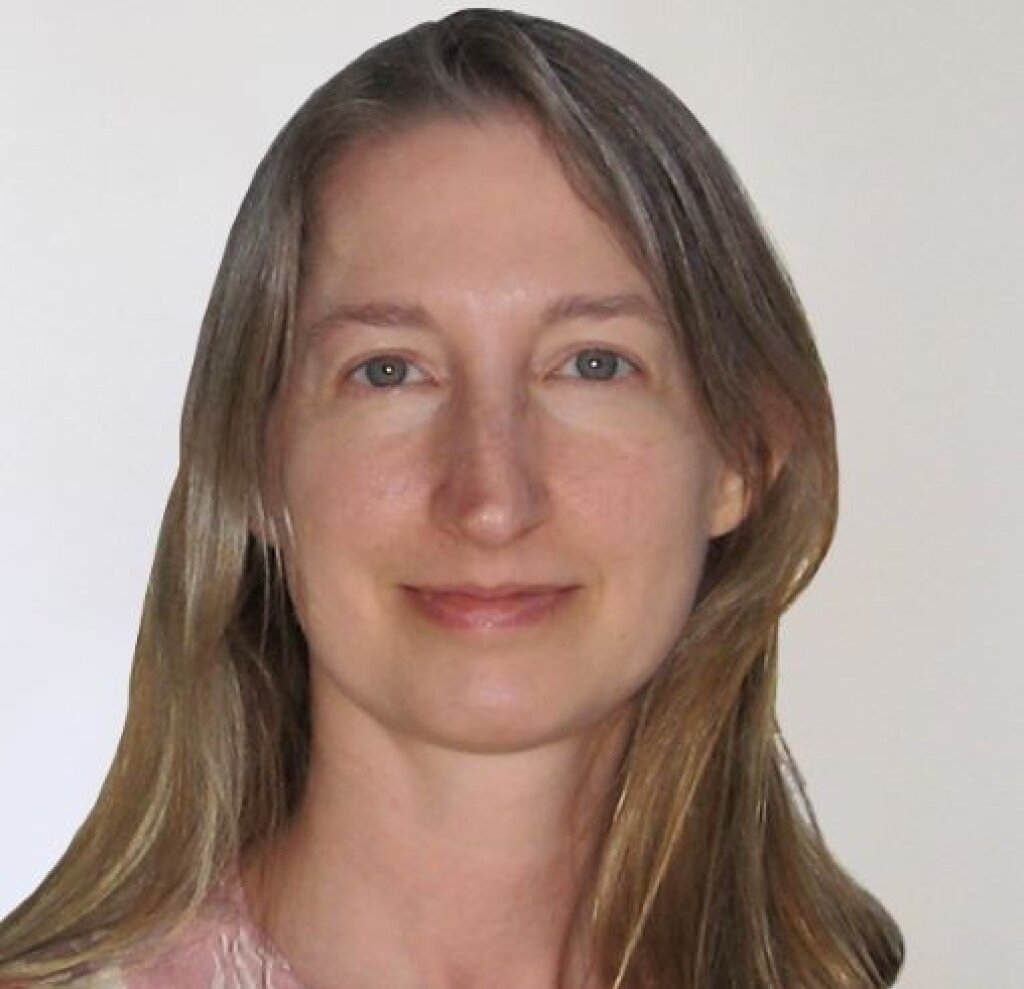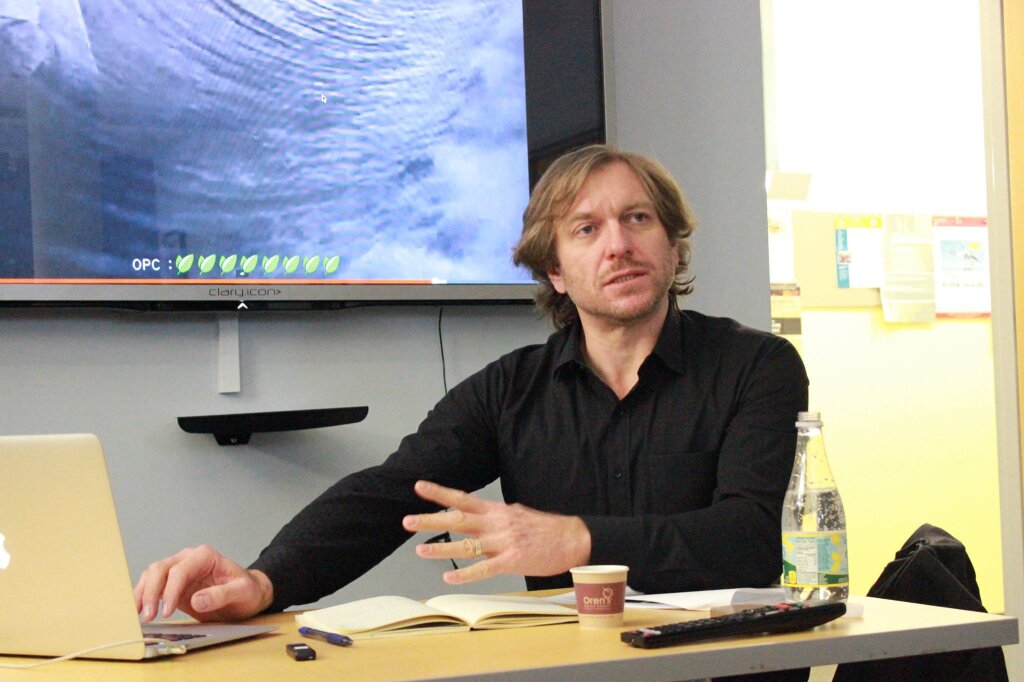Watch the video of the event here
The year 2012 saw an unprecedented explosion of dialogue between the public and the regime in Putin’s Russia, a place that, up until then, seemed like one ruled by stagnation and home to an apolitical citizenry. On Friday the Jordan Center and the Arthur L. Carter Journalism Institute co-hosted the first of several conferences to be held this academic year, appropriately drawing upon the variety of headline-making events in Russia during the previous year. Eliot Borenstein, Professor of Russian Literature at NYU, introduced the topic of discussion as a year in which Russia saw “a return to politics.”
The panel discussion provided a venue for each guest to reflect on this momentous swing in Russian political life and its manifestation within their particular area of expertise. The floor was then opened up for audience participation.
Kevin Platt, Professor of Slavic Languages and Literatures and Graduate Chair of the Comparative Literature Program at the University of Pennsylvania, opened up the panel with his lecture “The Cultural Location of Protest.” Platt examined the surprisingly radical performance art based approach of the newly re-found Russian protest movement of the past few years in the context of Soviet independent art. Platt highlighted the great deal of comparisons that have been drawn between these two protest-art movements, yet challenged the adequacy of these comparisons. He also expressed doubt as to whether contemporary art-as-protest movements are indicative of a viable political alternative.
Marijeta Bozovic, Assistant Professor of Slavic Languages and Literatures at Yale, brought to the discussion her specialization in contemporary Russian poetry. She offered insights into the politicization of Russian high culture, and the self-reflection of many of these poets, such as Kirill Medvedev, in regards to their dual roles in the canonical tradition of “Russian Poets” and as politically engaged, sometimes avant-garde poets. Unlike the artists mentioned by Platt, and the opposition movement as a whole, these poets are united as a solid community, despite their vast aesthetic and stylistic differences. Bozovic conceded at the close of her lecture that decisive change as a result of these poets’ political engagement remains to be seen, and she concluded by raising the question, “Who needs elite culture?”
Discussant Ilya Budraitskis offered an overview of the contemporary political situation, the state of the Left in Putin’s Russia, and the implications of the latest Moscow Mayoral elections. He began with a discussion of what he called a “crisis of the protest movement.” Aleksei Navalny, whom Budraitskis called “a very problematic figure” and his role in the latest Moscow elections, “is very important for understanding the nature of the crisis.” Indeed, Navalny became a topic for heated debate within the panel and the audience. One audience member asked Budraitskis to explain why he had posted on his Facebook page that he would be voting for Navalny, despite understanding the anti-corruption activist to be a nationalist, neoliberal—everything Budraitskis and the Left stand against. Budraitskis explained his decision as one based on “choosing the lesser of two evils.” Debate ensued over whether or not voting for Navalny could potentially create an even more disastrous political situation in the future.
Budraitskis went on to explain the differences between the pro-Navalny demonstrations of 2013, and the elections protests of 2011-2012. He admitted the Navalny demonstrations were “a bit scary” for him. Budraitskis described the aesthetic of the demonstrators as much more unified and their message much less idealistic. They simply stood behind the name Navalny. Budraitskis described the presence of the same political turbulence, yet with increasing momentum away from the ideals of the first wave of protests. “Now this happy time is over…it’s not just a protest movement now,” he explained. And referring to Navalny, “the leader of the opposition is a political leader now.”
The lively group discussion that followed raised questions about the merits of the protest movement, the likelihood of its continuation, and thoughts as to where it might go from here. Do the protestors and activists present a viable alternative? Or are they just “middle class brats,” as one audience member proposed? There was some disagreement about whether the protest movement was authentic in its representation of a genuine constituency in Russia, or whether artist-activists represent only a small slice of privileged, Westernized young people.
Eliot Borenstein closed with an appropriate prediction that 2012 very well could have marked an end to stagnation and “the start of the proverbial ‘interesting times’” in Russia. Given the questions raised about the protest movement and the wide-open future for politics, the arts, and protest in Russia, Borenstein’s prediction seems to be right on.
photo: from left Kevin Platt, Marijeta Bozovic, Ilya Budraitskis, Eliot Borenstein



